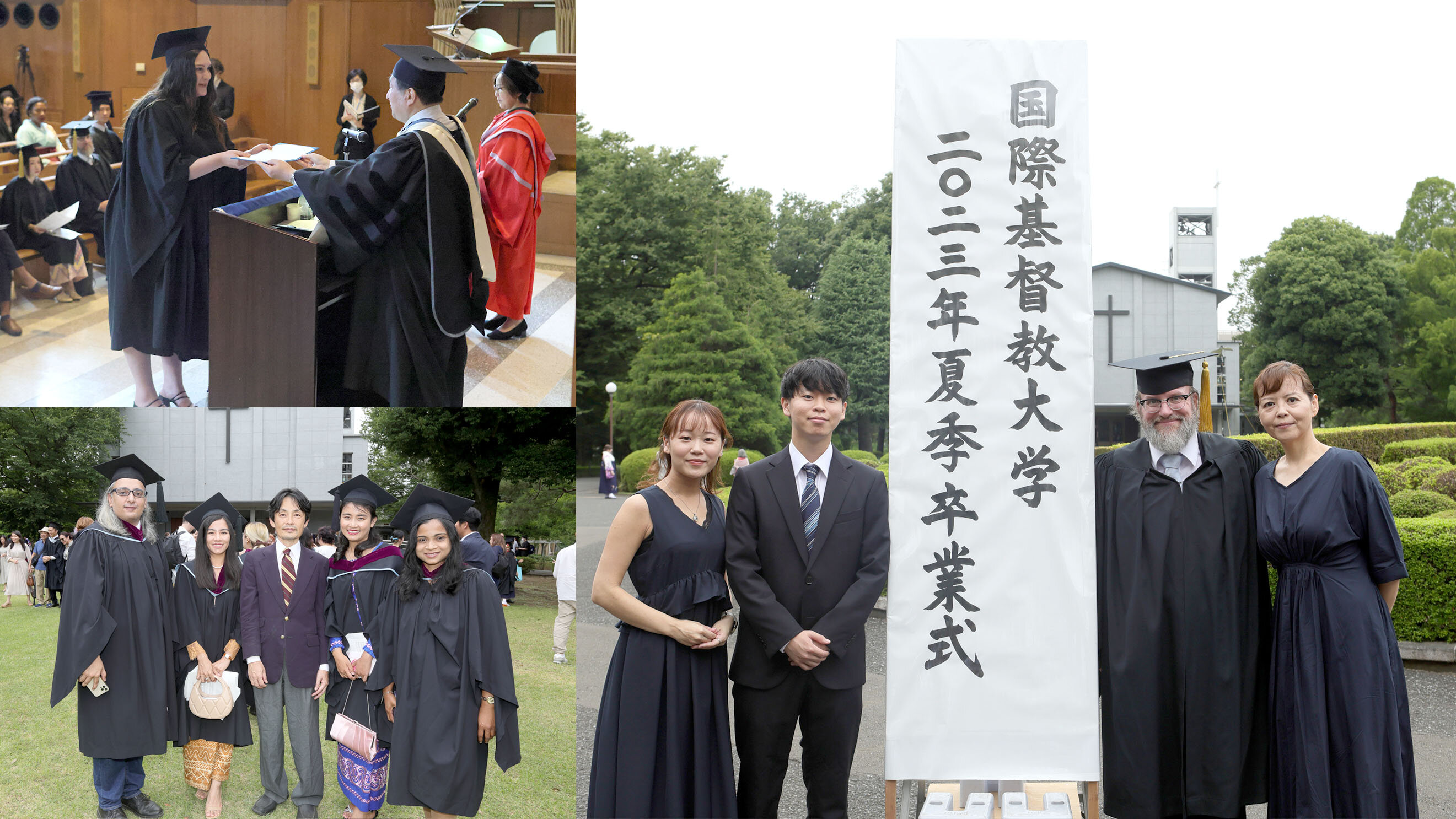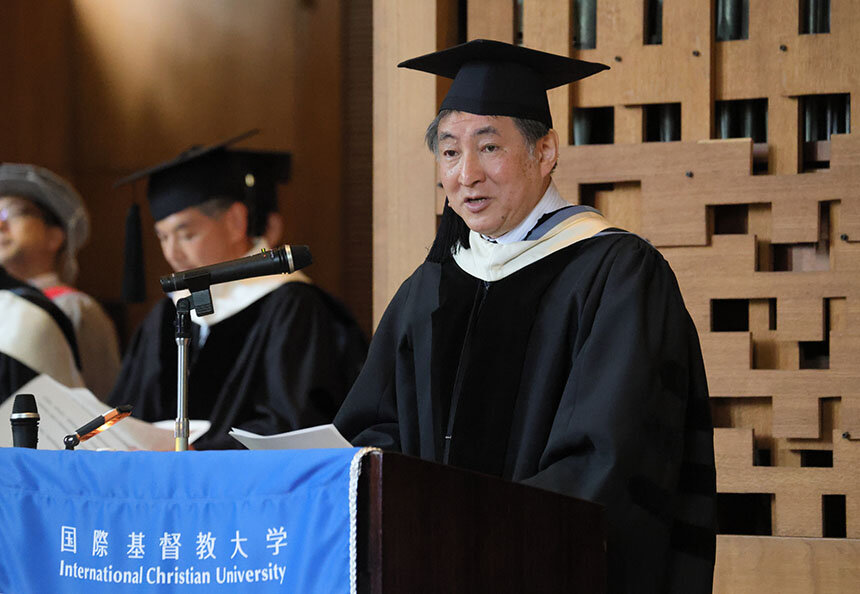NEWS
2023 Summer Commencement Ceremony
Update: July 14, 2023

131 undergraduate students and 46 graduate students graduated from ICU at its summer commencement ceremony held at the University Chapel on Friday, 14 July.
At the ceremony, each student's name was read out in keeping with tradition that has continued since the first commencement ceremony.
Also during the ceremony, the title of Professor Emeritus was conferred to Professor MALARNEY Shaun K and Professor Takashi Nishio with effect from April 1, 2023.
Scripture Reading: Hebrews 6: 10-12
Commencement Address by Shoichiro Iwakiri, President

Congratulations to all who have completed your Bachelor of Arts program in our Division of Arts and Sciences as well as to those who have finished the MA or PhD programs in our Graduate School of Arts and Sciences and who are graduating today. I also offer my sincere congratulations to all family members, relatives and friends of our graduates.
When you look back on your time of study and research at ICU, what comes first to your mind? It may be your days struggling under the Coronavirus pandemic, it may be a moment of joy and happiness you experienced during your campus life. Or it may be an image of yourself writing your dissertation in solitude; for as Hannah Arendt said: 'All thinking is done in solitude'.
If I asked you now: "What has been your greatest joy during your time as a student at ICU?", what would be your answer ?
I asked such a question to ChatGPT:
'Tell me about the happiest moment that you have ever had.'
It replied:
'I am an AI and therefore I do not have emotions. Not being able to have emotions or personal experiences, I do not have happy experiences.
This answer reminded me of a textual theory written by the critic Roland Barthes more than fifty years ago. He stated that, in literary texts, "language knows a 'subject', not a 'person'." He also put forward the idea that this "scriptor", or subject "no longer bears within him passions, humours, feelings, impressions". ('The Death of the Author', 1967).
Half a century later, we have come to an age in which the subject who "no longer bears within him passions, humours, feelings, impressions", that was born as a theoretical concept in literary theory, is actually generating texts in the real world as the first person subject of generative AI.
I think the fact that the subject 'I' in textual theory, which is devoid of feelings or experiences, also has no personality is a very important point.
I asked ChatGPT: 'What are you thinking about right now?'
It replied:
'As I am an artificial intelligence, I do not have emotions or individual consciousness. Therefore, I cannot have specific thoughts. I only generate responses based on programmes. How can I help you?
Probably Chat GPT is programmed to answer that it does not have an individual consciousness, and one day in the future someone will try to create an artificial intelligence that pretends to have a consciousness. At the moment, ChatGPT does not appear to be conscious. It is simply a programme that responds when questioned by people and cannot think spontaneously.
In education, there are fears that relying on AI will undermine the ability of students to think for themselves. I think one limitation should be added here: what is undermined by AI is the ability to 'think of answers'. AI is not a person, has no personality, no ability for spontaneous thinking. Yet, once we ask questions, AI produces sentences and documents that are sometimes difficult for us to determine as true or false.
The 'thinking' in Descartes' famous phrase 'I think, therefore I am' is a spontaneous thought. In Descartes' case, the 'I' is not necessarily the sense-subject, but we, as modern thinking subjects, also have senses. The critical thinking ability that you have acquired at ICU is established through spontaneous, thought-based dialogue with people with personalities, people with memories, feelings and experiences.
Personality is a very important concept in ICU's liberal arts education. Each of us speaks as an individual person. To rely on generative AI for such speech acts is to abandon the ability to ask questions on our own, and to become a person without a personality, simply responding to what is asked of us. This is a terrible thing, and there is no real richness in it. Through your liberal arts studies at ICU, you have developed a mind and intellect equipped with the skills to engage in dialogue and critical thinking, which are spontaneous. You have also developed an intellect and sensitivity open to diversity. This diversity also lives in the spontaneity of human beings and nature. If you have as your foundation the idea that every human being is a person, no matter how information technology develops in the future, you will be able to use it sensibly to create a better world.
After graduation, you will all enter a new stage of your life. In Shakespeare's 'As You Like It', one of the characters says:
This wide and universal theatre
Presents more woeful pageants than the scene
Wherein we play in.Shakespeare, As you like it (ACT II. Scene VII)
We play different roles in this 'wide and universal theatre' during our lifetime. At some moment, we may find ourselves on a stage completely different from the one we have known before.
Each person we meet there is not an artificial or virtual entity, but a 'person' with feelings, memories and experiences. It is a dialogue partner who has formed a personality not only through joy, but also through suffering and sorrow.
Today's Bible passage contains the words 'patience' and 'hope'. In Romans we also read: 'Suffering produces perseverance, perseverance produces discipline, discipline produces hope'. According to New Testament scholar Prof. Yakiyama, the original Greek word for "discipline" is the feminine noun "dokimē" (δοκιμη), meaning 'trials' by which a person's faith or nature is put to the test. In other words, "hardship produces perseverance, and through perseverance a person's essence and dignity are tested, and through these trials hope is born". It probably takes a long time to know the essence and dignity within you. But your studies at ICU will support you in this journey.
Today, on the day of your graduation, I have only one wish for you. Be a person with hope. A person who values the memories, feelings and experiences in yourself and in others. In that deep human understanding, please do your best to create a better world of tomorrow and live a good life.
Professor Emeritus
Professor MALARNEY Shaun K
Prof. Malarney obtained his M.A. and Ph.D. in Anthropology from the University of Michigan and B.A. (Summa Cum Laude) from Boston University. He was appointed as Assistant Professor in the Division of International Studies in the College of Liberal Arts at ICU in September 1995, Associ-ate Professor in 2001, and promoted to Full Professor in 2005. He is a prominent scholar and re-searcher in cultural anthropology, Vietnam studies, colonial medical history, and cultures of sport hunting.
Professor Malarney has not only contributed to the university as a dedicated educator and re-searcher, but he has also provided extensive service to ICU. To mention only some of the positions he has held, he has served as the Dean of International Affairs, Director of Faculty Development, Chair of Sociology and Anthropology Department, Acting Division Chair of International Studies Division, Director of the Graduate School Program of Public Policy and Social Research, and most recently Chair of Faculty Council. For all the positions he held, he was passionate and devoted to improving the university's management and education.
Professor Takashi Nishio
Prof. Nishio is one of Japan's most prominent and influential public policy specialists. He has not only published influential and widely used textbooks and over a hundred articles and book chapters on a wide variety of problems and issues in public policy, but he also authored and guided research on, for example, forest governance and how to improve the relationship in particular between local government and citizens.
Prof. Nishio has served ICU for more than three-and-a-half decades. He joined ICU in 1986 as a tenured instructor and promoted to full professor in 1998. During this time, he strengthened and shaped the field of Public Administration in the CLA and the Graduate School and was central in establishing public policy or PPL as a major at the time of the introduction of the major system in 2008. Prof. Nishio was also essential in estab-lishing service learning at ICU from 2002. As CLA Dean between 2009 and 2013, Prof. Nishio initiated and guided several reform projects and early reforms of the then still new major and departmental system.
